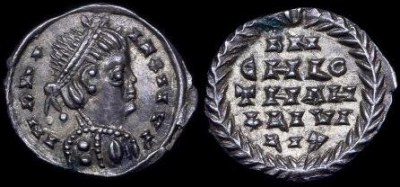The Merovingian dynasty () was the ruling family of the Franks from the middle of the 5th century until 751. They first appear as "Kings of the Franks" in the Roman army of northern Gaul. By 509 they had united all the Franks and northern Gaulish Romans under their rule. They conquered most of Gaul, defeating the Visigoths (507) and the Burgundians (534), and also extended their rule into Raetia (537). In Germania, the Alemanni, Bavarii and Saxons accepted their lordship. The Merovingian realm was the largest and most powerful of the states of western Europe following the breaking up of the empire of Theodoric the Great.
The dynastic name, medieval Latin Merovingi or Merohingii ("sons of Merovech"), derives from an unattested Frankish form, akin to the attested Old English Merewowing, with the final -ing being a typical Germanic patronymic suffix. The name derives from King Merovech, whom many legends surround. Unlike the Anglo-Saxon royal genealogies, the Merovingians never claimed descent from a god, nor is there evidence that they were regarded as sacred.
The Merovingians' long hair distinguished them among the Franks, who commonly cut their hair short. Contemporaries sometimes referred to them as the "long-haired kings" (Latin reges criniti). A Merovingian whose hair was cut could not rule, and a rival could be removed from the succession by being tonsured and sent to a monastery. The Merovingians also used a distinct name stock. One of their names, Clovis, evolved into Louis and remained common among French royalty down to the 19th century.
The first known Merovingian king was Childeric I (died 481). His son Clovis I (died 511) converted to Christianity, united the Franks and conquered most of Gaul. The Merovingians treated their kingdom as single yet divisible. Clovis's four sons divided the kingdom among themselves and it remained dividedwith the exception of four short periods (55861, 61323, 62934, 67375)down to 679. After that it was only divided again once (71718). The main divisions of the kingdom were Austrasia, Neustria, Burgundy and Aquitaine.
During the final century of Merovingian rule, the kings were increasingly pushed into a ceremonial role. Actual power was increasingly in the hands of the mayor of the palace, the highest-ranking official under the king. In 656, the mayor Grimoald I tried to place his son Childebert on the throne in Austrasia. Grimoald was arrested and executed, but his son ruled until 662, when the Merovingian dynasty was restored. When King Theuderic IV died in 737, the mayor Charles Martel continued to rule the kingdoms without a king until his death in 741. The dynasty was restored again in 743, but in 751 Charles's son, Pepin the Short, deposed the last king, Childeric III, and had himself crowned, inaugurating the Carolingian dynasty.
Chlothar I (c. 497 – 29 November 561) was a king of the Franks of the Merovingian dynasty and one of the four sons of Clovis I.
Chlothar's father, Clovis I, divided the kingdom between his four sons. In 511, Clothar I inherited two large territories on the Western coast of Francia, separated by the lands of his brother Childebert I's Kingdom of Paris. Chlothar spent most of his life in a campaign to expand his territories at the expense of his relatives and neighbouring realms in all directions.
His brothers avoided outright war by cooperating with Chlothar's attacks on neighbouring lands in concert or by invading lands when their rulers died. The spoils were shared between the participating brothers. By the end of his life, Chlothar had managed to reunite Francia by surviving his brothers and seizing their territories after they died. But upon his own death, the Kingdom of the Franks was once again divided between his own four surviving sons. A fifth son had rebelled and was killed, along with his family.
Chlothar's father, Clovis I, had converted to Nicene Christianity, but Chlothar, like other Merovingians, did not consider that the Christian doctrine of monogamy should be expected of royalty: he had five wives, more from political expediency, for the purpose of forming alliances, than for personal motives. Although at the instigation of his queens he gave money for several new ecclesiastical edifices, he was a less than enthusiastic Christian and succeeded in introducing taxes on ecclesiastical property.

 English
English  español
español  français
français  português
português  русский
русский  العربية
العربية  简体中文
简体中文 
